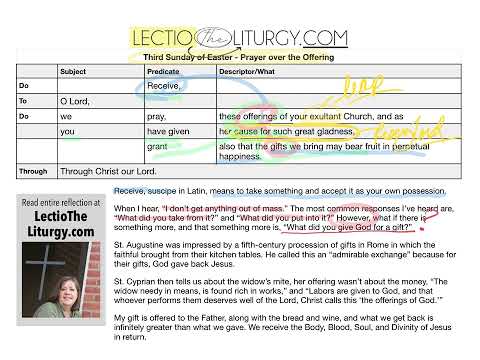Prayer Over the Offering 3rd Sunday of Easter
One of the first things I do when I read through a prayer is to look for any phrases or words that match, and in this week’s prayer, we’ve got some great pairs. This week, we Lectio the Liturgy with the Prayer Over the Offering for the Third Sunday of Easter.
- Receive, O Lord, we pray, these offerings of your exultant Church, and, as you have given her cause for such great gladness, grant also that the gifts we bring may bear fruit in perpetual happiness. Through Christ our Lord.
Receive, or suscipe in Latin, is a great verb to start the prayer as to receive means to take something and accept it as your own possession. We are asking God to receive our offerings. In the prayer, they’re also called the gifts, that we bring to the Lord.
The offerings come from an exultant Church. Exultant means to leap. To be honest, I have never seen anyone physically leap for joy when they came into church, but I hope our hearts are leaping for joy. The prayer tells us that the exultant Church has been given a reason, or cause for such great gladness. Where does our joy come from? Our Risen Savior.
By now, the 3rd Sunday of Easter, the newness may have worn off. The Easter lilies at church may look a little drowsy, the new Sunday best clothing and shoes are no longer new, but the Resurrection of Jesus has not lost its power. Today and every day is a good day to remind ourselves that we are Easter people.
The last petition of the prayer is that the gifts we bring may bear fruit in perpetual happiness. Let’s just say that when we give an offering to Jesus, we get more than what we give. Actually, the same applies to what we give and get from Mass.
I have often heard the statement, “I don’t get anything out of mass.” The most common responses I’ve heard are, “What did you take from it?” and “What did you put into it?” However, what if there is something more, and that something more is, “What did you give God for a gift?”
St. Augustine was impressed by a fifth-century procession of gifts in Rome in which the faithful brought from their own homes, things from their kitchen tables. He called this an “admirable exchange” because for their gifts, God gave back Jesus.
St. Cyprian also wrote about offerings, “You are wealthy and rich, and do you think that you celebrate the Lord's Supper, not at all considering the offering, who come to the Lord's Supper without a sacrifice, and yet take part of the sacrifice which the poor man has offered?” He goes on about the Gospel story of the widow who gave all she had, two mites, into the temple treasury. He continues, “The widow needy in means, is found rich in works.”
St. Cyprian then tells us that “Labors are given to God, and that whoever performs them deserves well of the Lord, Christ calls this ‘the offerings of God.’”
What does giving God an offering mean and what would we have to offer him? During the Mass, the priest prays, “Pray, brothers and sisters, that my sacrifice and yours be pleasing to God, the Almighty Father.” My sacrifice will range from something that I’m worried about, to someone who needs prayer, to, as St. Cyprian calls it, a labor given to God, and I’ve even given God a gift as simple as thanksgiving for His goodness.
My gift is offered to the Father, along with the bread and wine, and what we get back is infinitely greater than what we gave. We receive the Body, Blood, Soul, and Divinity of Jesus in return.
Perpetual happiness comes when we, gathered as believers, offer gifts and receive Jesus. We are filled with the goodness of the Holy Spirit. Sometimes, it is good to be reminded of how special God thinks we are.
Thanks for praying with me,
Julie
